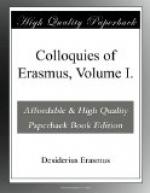Sic existimet,
sciat,
Responsum, non
dictum esse, quid laesit prior,
Qui bene vertendo,
et ects describendo male, &c.
Let him so esteem or know, that it is an Answer, not a common Saying; because he first did the Injury, who by well translating and ill describing them, &c._
In these Words I want a witty Sense, and such as is worthy of Terence. For he did not therefore do the Wrong first, because he translated the Greek Comedies badly, but because he had found Fault with Terence’s.
Eu. According to the old Proverb, He that sings worst let him begin first. When I was at London in Thomas Linacre’s House, who is a Man tho’ well skill’d in all Manner of Philosophy, yet he is very ready in all Criticisms in Grammar, he shew’d me a Book of great Antiquity which had it thus:
Sic existimet, stiat, Responsum, non dictum esse, quale sit prius Qui bene vertendo, et eas describendo male, Ex Graecis bonis Latinas fecit non bonas: Idem Menandri Phasma nunc nuper dedit.
The Sentence is so to be ordered, that quale sit may shew that an Example of that which is spoken before is to be subjoin’d. He threatened that he would again find Fault with something in his Comedies who had found Fault with him, and he here denies that it ought to seem a Reproach but an Answer. He that provokes begins the Quarrel; he that being provok’d, replies, only makes his Defence or Answer. He promises to give an Example thereof, quale sit, being the same with [Greek: oion] in Greek, and quod genus, veluti, or videlicet, or puta in Latin. Then afterwards he brings a reproof, wherein the Adverb prius hath Relation to another Adverb, as it were a contrary one, which follows, viz. nuper even as the Pronoun qui answers to the Word idem. For he altogether explodes the old Comedies of Lavinius, because they were now lost out of the Memory of Men. In those which he had lately published, he sets down the certain Places. I think that this is the proper Reading, and the true Sense of the Comedian: If the chief and ordinary Poets dissent not from it.
Gu. We are all entirely of your Opinion.
Eu. But I again desire to be inform’d by you of one small and very easy Thing, how this Verse is to be scann’d.
Ex Graecis bonis Latinas fecit non bonas.
Scan it upon your Fingers.
Hi. I think that according to the Custom of the Antients s is to be cut off, so that there be an Anapaestus in the second Place.
Eu. I should agree to it, but that the Ablative Case ends in is, and is long by Nature. Therefore though the Consonant should be taken away, yet nevertheless a long Vowel remains.
Hi. You say right.
Cr. If any unlearned Person or Stranger should come in, he would certainly think we were bringing up again among ourselves the Countrymens Play of holding up our Fingers (dimicatione digitorum, i.e. the Play of Love).




